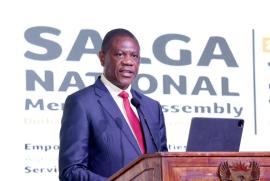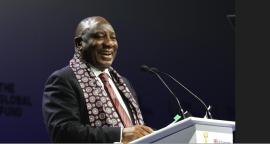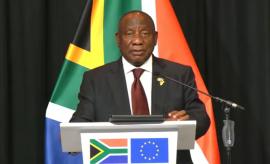Deputy President Paul Mashatile has recognised significant systemic weaknesses that undermine the effectiveness of the South African state, calling for the construction of a capable government and the reform of the political-administrative interface.
The Deputy President cited the synthesis evaluation, conducted by the Human Sciences Research Council (HSRC), which reveals deep-rooted challenges in public service delivery and institutional stability.
Key findings highlight critical issues, including high turnover among Directors-Generals(DGs), persistent political interference in administrative decisions, and weak performance management systems.
The report found that these problems are eroding institutional memory, compromising policy continuity, and undermining public trust.
“The significance of today’s engagement cannot be overstated as we progress in our commitment to establishing a capable and developmental state, which continues to be a key priority of the seventh administration,” he said on Friday.
Deputy President Mashatile was leading a roundtable discussion on strengthening the political and administrative interface at the Sefako Makgatho Presidential Guest House in Pretoria.
WATCH | Deputy President leads roundtable on the Political and Administrative Interface
The engagement is part of the broader efforts by the Presidency to support the implementation of the National Development Plan (NDP) 2030.
The NDP emphasises the importance of establishing a capable and developmental state to address the country’s socio-economic challenges effectively.
To address these challenges, Deputy President Mashatile said government is implementing a comprehensive National Framework for Public Service Professionalisation.
This initiative aims to create a more meritocratic, competent, and accountable public service, with plans to establish clearer lines of accountability and reduce political interference in administrative processes.
It also involves improving leadership stability in government departments and strengthening intergovernmental collaboration.
The Deputy President recognised that resolving these institutional weaknesses is crucial for achieving the Government of National Unity’s (GNU) strategic priorities of inclusive economic growth, poverty reduction, and building a developmental state.
“Central to us attaining these three strategic priorities is ensuring sound institutional design that is responsive to the prevailing challenges and the nuances of a modern state that is agile enough to respond to a rapidly changing environment.”
The Deputy President has defined a capable and developmental state as a government that has essential resources and skills to successfully execute policies that foster economic growth and enhance the well-being of its citizens.
In addition, he said a developmental, capable and ethical state requires skilled managers, especially DGs and Heads of Department, with clear lines of authority and accountability to execute their duties in a way that achieves optimal outputs and agreed outcomes.
“This requires a political and administrative environment that is free from undue political interference, with effective systems, and with a consistent and fair application of rules.”
He told the attendees that the urgency to enhance state capacity has never been more pressing.
“Our nation has made strides in the past, overcoming immense challenges to secure our democracy and pursue socio-economic progress. Yet, we acknowledge that there are areas where our state machinery still lags behind, hindering our ability to deliver on the promises of our Constitution.”
He acknowledged that the tensions and instability in relationships at this interface remain a matter of great concern for all respondents, both accounting officers and executive authorities.
“Without doubt, these problems are compounded by a history of apartheid and its lingering effects, corruption, skills gaps, and a lack of accountability.”
The country’s second-in-command has called for a state that will ensure that citizens have access to basic services, a growing economy that creates jobs and a youthful population is inspired to build viable start-ups that can compete on a global level.
“If we are serious about building a capable, developmental and ethical state, we must recognise that reforming the interface is the precondition, not the afterthought.”
He also called for the establishment of war rooms focused on the economy, poverty, and clean governance, aiming to improve payment cycles and procurement processes, especially for small, medium and micro enterprises (SMMEs).
In his address at the gathering, Public Service and Administration Minister Mzamo Buthelezi emphasised the critical need for a more transparent, ethical, and efficient relationship between the political leadership and public administration.
READ | Minister advocates for transparency and ethics at roundtable
Buthelezi welcomed the platform to reflect the relationship between the political heads and the accounting officers.
“The interface forms a crucial pillar of their capacity, as it invites us to look deeply at the architecture of our governance,” he told the attendees. – SAnews.gov.za















